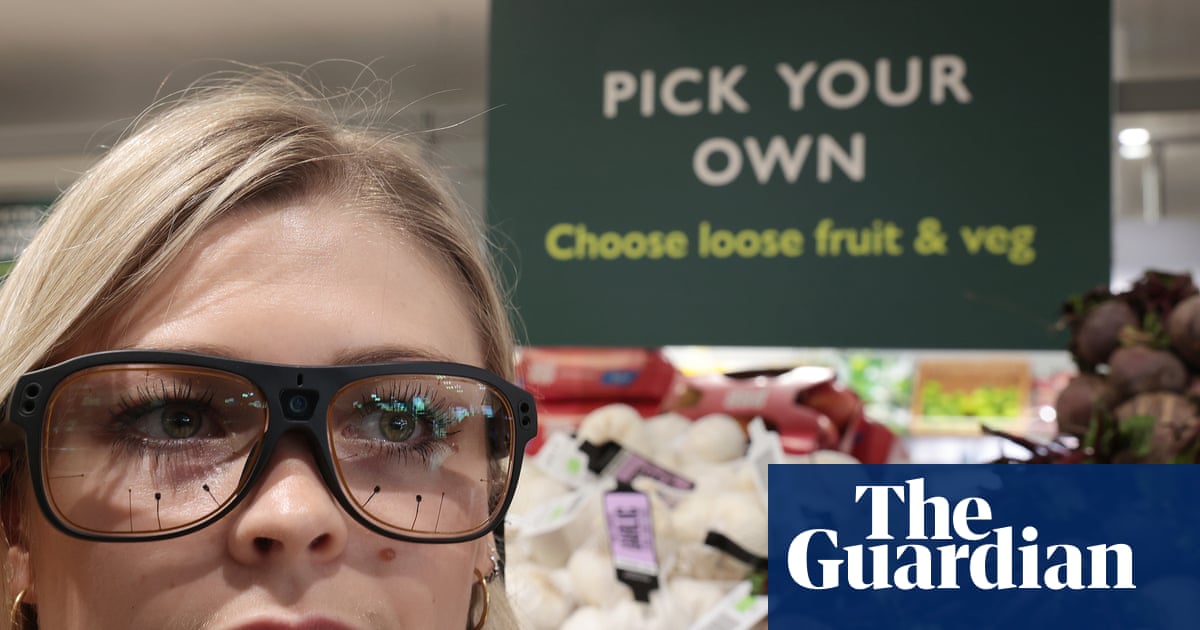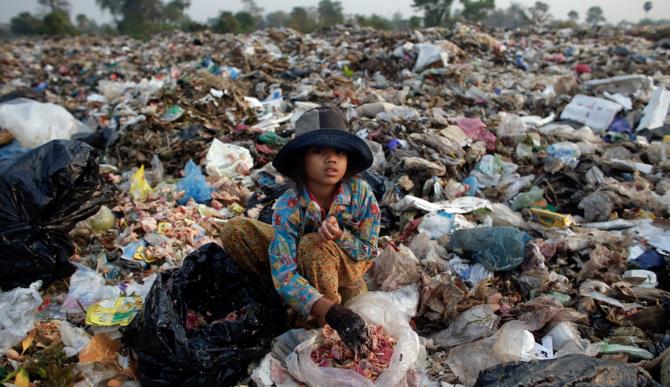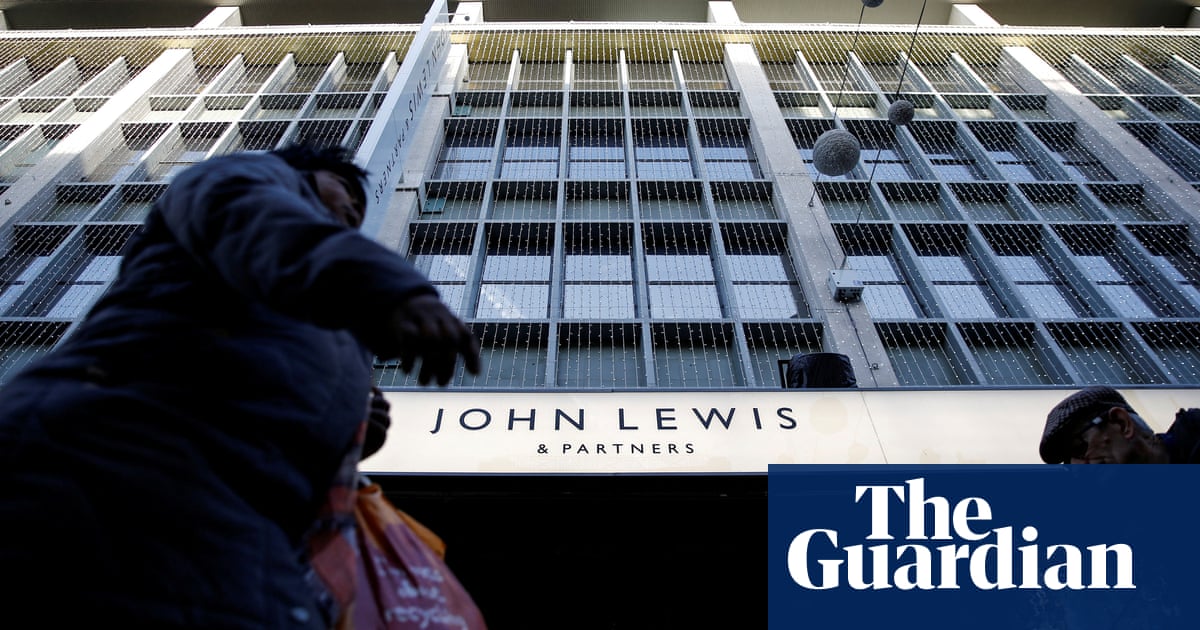
With thick black frames and hidden cameras, the glasses look designed for espionage or the metaverse but instead the eye-tracking headgear is being deployed to get inside shoppers’ heads as part of the drive to cut plastic packaging from the weekly food shop.
It is an unlikely scene. Hooked up with the glasses a shopper is being tailed around a Waitrose produce department by a researcher carrying a large tablet that displays live footage of them picking up banal things such as potatoes, apples and bananas.
While not cinematic the film clips will be analysed by experts who are looking at the in-store messages that are the most effective at getting people to switch from buying pre-packaged fruit and veg to picking and weighing their own.
The store in Thatcham, Berkshire, is being used to see if prompts such as “same quality, no packaging” and “perfectly packaged by nature” can help break a cycle that contributes to UK households throwing away nearly 100bn pieces of plastic packaging a year.
Shoppers have got used to the “convenience” of plastic packaging, says Joanna Linley of the anti-waste charity Wrap, who helped set up the trial. “Regardless of what we say, and what we know we should do, realistically when we go into a shop grabbing a bag of something is much easier and more convenient than buying something loose.”
In 2018 UK supermarkets and food companies signed up to voluntary targets to cut plastic packaging over the next seven years. The goals of the UK Plastics Pact – which is led by Wrap, whose work helps shape government policy on sustainability matters – include 30% of all fresh produce being sold loose by 2025.
However, the industry looks set to miss that target. A progress report published late last year said that in 2022 an average of 19.4% of fresh produce sales was loose, with the proportion by retailer varying from 2% to 30%.
There are compelling reasons to “choose loose”. Fresh fruit and veg is responsible for more food waste than anything else we buy, with 1.6m tonnes – nearly £4bn worth – thrown away each year. Removing the packaging should mean less plastic and food waste because households will be able to buy closer to the right amount.
But at the moment supermarkets offer primarily pre-packaged produce because that is what sells, and people buy it because that is on the shelves. In 2019 Iceland abandoned a loose produce trial after it led to a 30% drop in sales. “I certainly can’t justify investing millions in new tills and scales to offer something our customers don’t want to buy,” said its boss, Richard Walker, at the time.
Part of the reason packaging keeps sales higher is that shoppers pay more when they buy a bagged kilo of spuds instead of just the three or four they need. However, many also seem to prefer the convenience and perceived hygiene benefits of pre-priced packets.
A recent Wrap study on the topic included some telling customer testimonials. One said: “I do a serious job and I have lots of things to think about … so when I go to Aldi I don’t want to have a debate about what I’m doing.” Others said they were put off by the thought of “other people touching the fruit” or simply “like the convenience” of picking up a packet.
The study concluded that for loose to become the norm again it was not as simple as asking people or supermarkets to change. “We will need interventions that work across the system, shifting the environments, incentives and norms that drive the buying and selling of pre-packaged fruit and veg,” it said.
“The biggest thing we need is for people to choose loose when it’s available,” says Linley. “It’s obviously great asking the retailers to sell more loose but if people aren’t choosing it, then there’s a real disconnect.”
Waitrose currently sells roughly 100 loose produce lines (about 16% of its range) and did not change the level of choice for the trial. The retailer is committed to offering more loose fruit and veg in store, says Catherine Loader, its sustainability manager, but the reality is complicated. There is no point removing packaging if it means more is then required in the supply chain, for example.
“One of the biggest challenges is that customers pick up items, go to the weighing scales, and then only at that point realise how much they’re actually going to be paying,” says Loader. “That’s something that we’ve been working on … how do we move to per piece pricing, so it’s really clear.”
As well as eye-tracking data that will create a “heat map” of the most effective signage, another 300 Waitrose shoppers will be interviewed – split across Thatcham and a “control” store. The results will be shared with rival supermarkets.
Rachel Green, who has popped into the store during her lunch break, has not noticed the signs but already buys loose anyway. “I think it’s quite nice that you can actually touch what you are buying,” she says. “I go home and wash it anyway.”
Another shopper, who has just recycled a bag of soft plastic packaging in store, says she “can’t be bothered to fiddle around counting out potatoes” as she needs a lot so is going to pay more for the ease of picking up a bag. Potatoes are the UK’s most wasted food with nearly 3m thrown away every day.
Faced with the same plastic problem countries such as France have passed laws banning packaging on many products and it has been reported that the UK government is considering introducing new guidelines. Tesco, the UK’s biggest supermarket, has said it would welcome “effective government intervention on produce packaging removal”.
“This should start with products we think are most achievable – for example where multiple retailers share the same supplier,” wrote Ashwin Prasad, Tesco’s chief product officer, in its 2023 packaging update report. “Government intervention will ensure change is made at scale and create a level playing field – where packaging changes will not put any one retailer at a competitive disadvantage.”
Asked about the reports of a packaging ban, the Department for Environment, Food and Rural Affairs says only that it is “leading the global effort to reduce food waste with a commitment to halve it by 2030” and “continued to support Wrap on their campaigns”.
Wrap is now conducting a global policy review of legislation in this area and says: “Any policy (ban or otherwise) that is considered should be developed in consultation with industry to avoid any negative unintended consequences. At this time, no changes in the law have been announced.”












